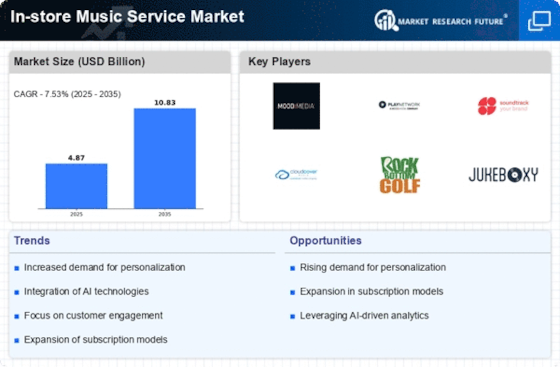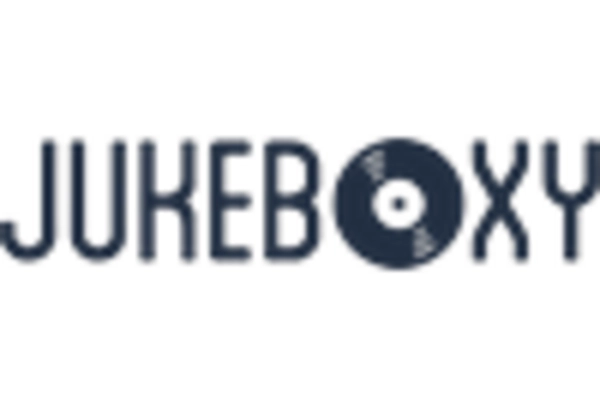Rise of Retail Competition
In the In-store Music Service Market, the rise of retail competition is a significant driver. As businesses seek to differentiate themselves, the use of music as a strategic tool becomes more prevalent. Retailers are increasingly aware that the auditory environment can influence consumer behavior, leading to a potential increase in sales. Data suggests that 60% of retailers are now investing in music services to create a unique shopping atmosphere. This competitive landscape compels businesses to adopt advanced music solutions, thereby propelling growth in the in-store music service sector. The need for differentiation through sensory experiences is likely to continue shaping market dynamics.
Growing Demand for Brand Identity
The In-store Music Service Market is witnessing a growing demand for brand identity through music. Retailers are increasingly recognizing that music can serve as a powerful branding tool, helping to convey their brand values and personality. This trend is supported by research indicating that 80% of consumers associate specific music styles with particular brands. As businesses strive to create a cohesive brand experience, the demand for customized music solutions is likely to rise. This focus on brand identity through auditory elements may lead to an expansion of services offered within the in-store music sector, further driving market growth.
Enhancement of Customer Experience
The In-store Music Service Market is increasingly recognized for its role in enhancing customer experience. Research indicates that a well-curated music selection can lead to longer dwell times in retail environments, potentially increasing sales. For instance, studies show that stores utilizing tailored music playlists can see a 20% increase in customer satisfaction. This enhancement is not merely anecdotal; it is supported by data suggesting that 70% of consumers feel that music positively influences their shopping experience. As retailers strive to create immersive environments, the demand for sophisticated in-store music services is likely to grow, driving innovation and investment in this sector.
Increased Focus on Consumer Engagement
In the In-store Music Service Market, there is an increased focus on consumer engagement as a key driver. Retailers are now more aware that engaging customers through music can lead to enhanced loyalty and repeat visits. Studies indicate that stores with strategically selected music can see a 30% increase in customer retention rates. This understanding is prompting businesses to invest in tailored music services that resonate with their target audience. As the importance of consumer engagement continues to rise, the in-store music service market is likely to expand, with more retailers seeking to leverage music as a means of fostering deeper connections with their customers.
Technological Advancements in Music Delivery
Technological advancements are reshaping the In-store Music Service Market, enabling more efficient and effective music delivery systems. Innovations such as cloud-based music streaming and AI-driven playlist generation are becoming commonplace. These technologies allow retailers to easily manage and customize their music offerings, which can lead to improved customer engagement. For example, the integration of machine learning algorithms can analyze customer preferences and adjust playlists in real-time, enhancing the shopping experience. As these technologies evolve, they are expected to drive further growth in the market, with projections indicating a potential increase in market size by 15% over the next five years.


















Leave a Comment